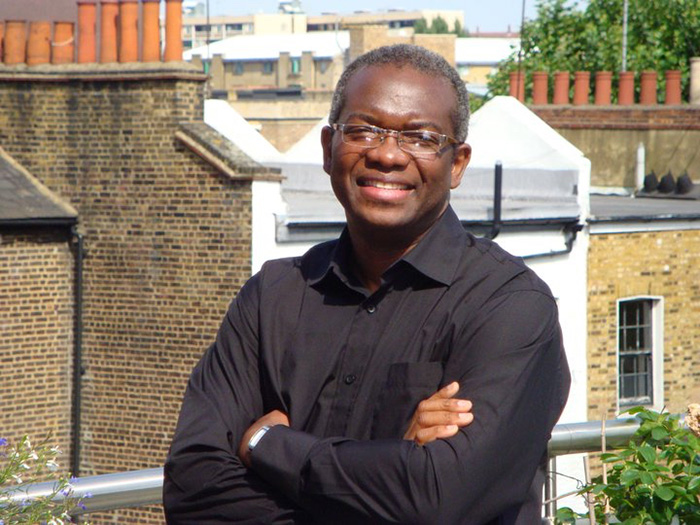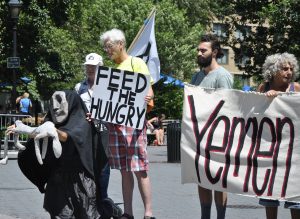بعد تعذيبه في الكاميرون ، صحفي يلجأ الى اسكوتلندا
[vc_row][vc_column][vc_custom_heading text=””][vc_row_inner][vc_column_inner][vc_column_text] [/vc_column_text][/vc_column_inner][/vc_row_inner][/vc_column][/vc_row][vc_row][vc_column][vc_column_text]
[/vc_column_text][/vc_column_inner][/vc_row_inner][/vc_column][/vc_row][vc_row][vc_column][vc_column_text]
يدرك تشارلز أتانغانا مثل أي شخص تحديات العمل الصحفي في الكاميرون. في تسعينات
القرن الماضي وأوائل العقد الأول من القرن الحالي ، كان أتانغانا مراسلاً استقصائياً يغطي
القضايا الاقتصادية مع صحيفة "لا سينتينيل" (أغلقت منذ ذلك الحين)، وكذلك صحيفة لو
ميساجير ، أول صحيفة مستقلة في الكاميرون ، وكثيراً ما كان يشارك في تقارير حول سوء
الإدارة والفساد في هذه الدولة الواقعة في أفريقيا الوسطى.
هناك الكثير من القضايا التي تستحق التغطية في الكاميرون ، التي تحتل المرتبة ١٤٥ من بين
١٧٦ دولة على مؤشر الفساد التي تصدره منظمة الشفافية الدولية. احتل تقرير له عن انعدام
الشفافية في عائدات النفط الحكومية الصفحات الأولى لمدة ثلاثة أيام متتالية، فيما كشف تقرير
آخر له عن الرشوة في عملية القبول بالمدارس وتورط وزير التعليم آنذاك.
لهذا السبب، لم ترحب بتقاريره حكومة الرئيس بول بيا ، الذي حكم البلاد منذ عام ١٩٨٢
والذي يسجن عادة الصحفيين المنتقدين لحكومته. في عام ٢٠٠٤ ، ساهم أتانغانا في تنظيم
مؤتمر صحفي للمجلس الوطني للكاميرونيين الجنوبيين، وهي مجموعة تدعم استقلال الأقلية
الناطقة باللغة الإنجليزية في الكاميرون في جنوب غرب البلاد. خلال الفعالية ، تم اختطاف
أتانغانا واقتياده إلى مركز احتجاز عسكري في دوالا ، أكبر مدن الكاميرون ، حيث تعرض
للضرب والتعذيب على يد خاطفيه الذين أرادوا معرفة هوية مصادره داخل الحكومة.
يقول أتانغانا إنه من خلال طريقة استجوابه ، يمكنه أن يستنتج أن أمر احتجازه كان قد أتى من
وزير التعليم جوزيف أوونا ، وهو موالٍ للرئيس بيا منذ فترة طويلة ، وقد أصبح رئيسًا لاتحاد
كرة القدم في الكاميرون لاحقا. لم يرد أوونا على طلباتنا للتعليق. ونفى ابنه ، ماثياس إريك
أوونا نغوييني ، عبر فيسبوك ، نفى تورط والده في اعتقال أتانغانا ، زاعما أن بعض
الصحفيين "يريدون تبرير نفيهم وسعيهم للحصول على اللجوء السياسي باستعمال المعلومات
الزائفة".
تمكن أتانغانا من الفرار من السجن بمساعدة أقاربه، بعد أن أدرك أنه لم يعد بإمكانه البقاء في
أمان في الكاميرون. وفي نهاية المطاف شق طريقه إلى المملكة المتحدة ، حيث تم منحه
اللجوء بعد كفاح طويل ومضني.
يعيش أتانغانا اليوم في مدينة غلاسكو بإسكتلندا ، حيث يعمل صحافيًا حرًا. تحدث إلى آيلان
بيتون من غلوبال جورناليست حول تعرضه للتعذيب والفرار من الكاميرون والتحدي المتمثل
في الحصول على اللجوء في المملكة المتحدة. أدناه النسخة المحررة من نص المقابلة:
غلوبال جورناليست: ما الذي جذبك في البداية إلى العمل الصحافي؟
أتانغانا: منذ سن السادسة ، كان لدينا نشاط في المدرسة لتشجيع أولئك منا الذين يمكنهم قراءة
الصحف لقص مقالة تهمنا في عطلة نهاية الأسبوع ثم الصاقها على الجدار. كان معلمنا يطلق
على هذا اسم "مجلة الجدار".
[في الجامعة] انضممت إلى النادي الصحفي. كنا في بعض الأحيان نستقبل الصحفيين الذين
عملوا في الاذاعة للدخول والتحدث إلينا ومحاولة إعطائنا رؤوس الأقلام حول أسس العمل
الصحافي.
لم أكن مهتمًا للغاية بالعمل في ذلك الوقت لأن هؤلاء الأشخاص الذين جاءوا لزيارة الكلية
وشرحوا ما هي الصحافة … لم يكونوا أثرياء. ملابسهم – لم تكن مثيرة للإعجاب. لكن رأيي
تغير بعد أن نضجت. كنت أرى أحيانا بعض الصحفيين يتجولون وهم يحملون كاميرا. بدا
الأمر فجأة مثيرًا لي.
غلوبال جورناليست: كيف انتهى بك المطاف إلى التركيز على التحقيقات الاقتصادية؟
أتانغانا: عندما بدأت مسيرتي المهنية في الصحافة ، لم يكن أحد مهتمًا بالقضايا الاقتصادية.
كلما رأيت مثل هذه التقارير، كانت في العادة مجرد بيانات صحفية من الحكومة حول تمويلات
صندوق النقد الدولي … لم يكن هناك أي شخص يركز على التحقيق ومحاولة معرفة ما يجري
وراء الأرقام.
كنت قد تلقيت تدريبًا في شؤون الشركات من البنك الدولي ، حيث كنت أعمل. لذا قررنا أنا
وزملائي من وسائل الإعلام الرسمية إنشاء مجموعة للصحفيين الاقتصاديين.
كنا قد سئمنا من رؤية إعلانات عن مشاريع من الحكومة تقول أشياء مثل: "سنبني ٦٠٠ فصل
دراسي في المقاطعات في جميع أنحاء الكاميرون." فبمجرد الحصول على الأموال ثم انجاز
الأعمال، لم يكن هناك أحد يذهب الى نواحي البلاد لتفقدها – لأنك إذا فعلت ذلك ، فستجد أنه
ربما تم بناء خمسة أو عشرة فقط ، فيما قد تم إنفاق المال كله.
غلوبال جورناليست: كيف تصف الضغوط التي يواجهها الصحفيون في الكاميرون؟
أتانغانا: عندما يكتب الصحفي منتقدا شخصيات حكومية ، قد يتم الاتصال بهم أثناء خروجهم
الى البارات (مثلا) ويعرض عليهم رشوة.
قد يطلبون منك تخفيف حدة كتاباتك وربما وضع بعض اللمسات التجميلية حول وزير حكومي
أو شخص آخر. الصحفي في الكاميرون لا يجني الكثير من المال ، وبالتالي يمكن أن يكون
ذلك وسيلة فعالة [لإسكاتهم]. لكن في أوقات أخرى هناك تهديدات أو ضرب.
غلوبال جورناليست : على ماذا كنت تعمل عندما جذبت انتباه الحكومة؟
أتانغانا: في احد المرات، نشرت مقالة لي على الصفحة الأولى لمدة ثلاثة أيام. كانت تقرير عن
قضية تتعلق بشفافية الحكومة وعائداتها النفطية وكيف أن البنك الدولي أجبرهم أن بعدوا بأن
يوضحوا كيفية تحرك هذه الأموال مقابل الحصول على قرض كبير.
القضية كانت أنه للمرة الأولى ، تم اجبار الحكومة على الرضوخ. كان البنك الدولي قد قال إننا
سنعطيكم المال، لكن فقط إذا نشرت الحكومة الأرقام المتعلقة بتدفق النفط.
عملت أيضاً على تقرير أظهر كيف أن بعض المسؤولين في الجامعات كانوا يأخذون رشاوى
من الآباء لكي يقبلوا أولادهم. بعض هؤلاء الناس كانوا قريبين من وزير التعليم.
غلوبال جورناليست: ماذا كنت تفعل في اليوم الذي تم اعتقالك؟
أتانغانا: كنت قد قدّمت المتحدثين في مؤتمر قبل أن يتم استدعائي الى الخارج. لقد واجهني
ثلاثة رجال كانوا متنكرين في هيئة صحفيين ، لكن اتضح أنهم لم يكونوا كذلك. قال لي أحدهم:
"تشارلز ، لقد تابعنا كتاباتك ، ورأينا مداخلاتك على التلفزيون."
ثم بدأوا يضربونني. قاموا في الأول بصفع خدّي الأيسر ثمّ الايمن قبل أن يركلوني
ويطرحوني على الأرض.
تم نقلي إلى زنزانة الشرطة العسكرية في دوالا ، حيث كانوا يحتجزون عادة الأشخاص
الخطيرين ، لذا أفترض أن ذلك جعلني أحدهم. بقيت هناك لبضعة أسابيع ولم يكن أحد يعرف
أين ذهبت. فهمت من الأسئلة التي كانوا يطرحونها أن وزير التعليم هو الذي أمر باعتقالي.
غلوبال جورناليست ماذا اكانوا يريدون منك؟
أتانغانا: تم سؤالي عن هوية مصادري. كان هذا هو الشيء الرئيسي الذي أرادوا معرفته: من
في الحكومة كان يعطيني معلوماتي. كانت لدي اتصالات جيدة للغاية في اللجان الحكومية –
التعليم والصحة والمالية وفي الجيش – وكان من الواضح لهم من خلال مقالاتي أن شخصًا ما
كان يعطيني معلومات سرية.
كانت الليلة الثانية مؤلمة لأنني تعرضت للضرب المبرح. أتذكر ، في الليلة الأولى أنني قد
نمت على الأرض في ملابسي الداخلية ولكن في الليلة الثانية جعلوني أنام دون ملابسي
الداخلية. كانوا يستخدمون أسلاك ربطوها حول أعضائي التناسلية ليحاولوا الضغط عليّ
للكشف عن مصادري.
تعلمت دائما حماية مصادري. عندما كنت طالبًا ، أتت صحفية من واشنطن للتحدث معنا.
أخبرتنا أنه يجب علينا حماية مصادرنا بأي ثمن. كان الخيار هو: كشف مصادري وتدمير
سمعتي أو الموت من أجل حمايتها.
غلوبال جورناليست: كيف هربت إذن ؟
أتانغانا: بعد أسبوعين أدركت أنني كنت أواجه الموت. كان من السهل عليهم أن يقتلوني – لم
يكن أحد يعرف أين كنت محتجزاً. كانوا يطعمونني بشكل سيء لدرجة أنني أصبت بالإسهال ،
لذا طلبت منهم أن يأخذوني إلى المستشفى. هناك ، التقيت بشخص كان على وشك أن يطلق
سراحه وكان معه هاتف. تمكنت من إخبار هذا الرجل أن يوصل رسالة إلى أبي. كنت مع
شخص من الشرطة العسكرية ، لكنه لم يكن يعرف من أنا أو لماذا كنت هناك ، لذا وعدته
بالمال. سمح لي بالخروج إلى موقف السيارات [حيث كان والدي ينتظر]. أختي لديها صديق
يسافر إلى فرنسا للعمل وتمكنت من تنظيم الذهاب في رحلة معه.
غلوبال جورناليست: ما مدى صعوبة الحصول على اللجوء في المملكة المتحدة؟
أتانغانا: كانت السنوات القليلة الأولى صعبة للغاية. استغرق الأمر مني بضعة أشهر للتعافي
من المحنة وبدأت أعود إلى حياة طبيعية.
أشعر أن التمييز في نظام اللجوء في المملكة المتحدة قوي. أنت تقضي كل وقتك في التحدث
إلى أشخاص في المنظمات حول بلد لم يزره أحد من الموظفين. كان ذلك صعبا جدا.
تم توقيفي في عام ٢٠٠٨ [في المملكة المتحدة] لأنه ظهر أن طلب اللجوء الخاص بي قد تم
رفضه. لم يصدقوا أنني صحافي حقيقي أو أنني كنت تحت التهديد.
تحدثنا إلى زميل قديم من البنك الدولي ، وبعث بيانا. فعل زميل من لو ميساجير الشيء نفسه.
ساعد الاتحاد الوطني للصحفيين في اسكتلندا كثيراً ، كما كتبت لجنة حماية الصحفيين في
الولايات المتحدة عني وقدمت بيانا حول وضع حرية الصحافة في الكاميرون.
كانت هناك حملة عامة وعريضة تضم أكثر من ٧٠٠٠ توقيع أرسلناها إلى وزارة الداخلية
البريطانية. كل هذا سمح بالإفراج عني وتم منحي [اللجوء] في عام ٢٠١١ بعد سبع سنوات
في جحيم الانتظار … سبع سنوات من الكفاح.
https://www.indexoncensorship.org/2018/02/tortured-cameroon-
reporter-found-asylum-scotland/
[/vc_column_text][/vc_column][/vc_row][vc_row][vc_column width=”1/4″][/vc_column][vc_column width=”3/4″][/vc_column][/vc_row]


